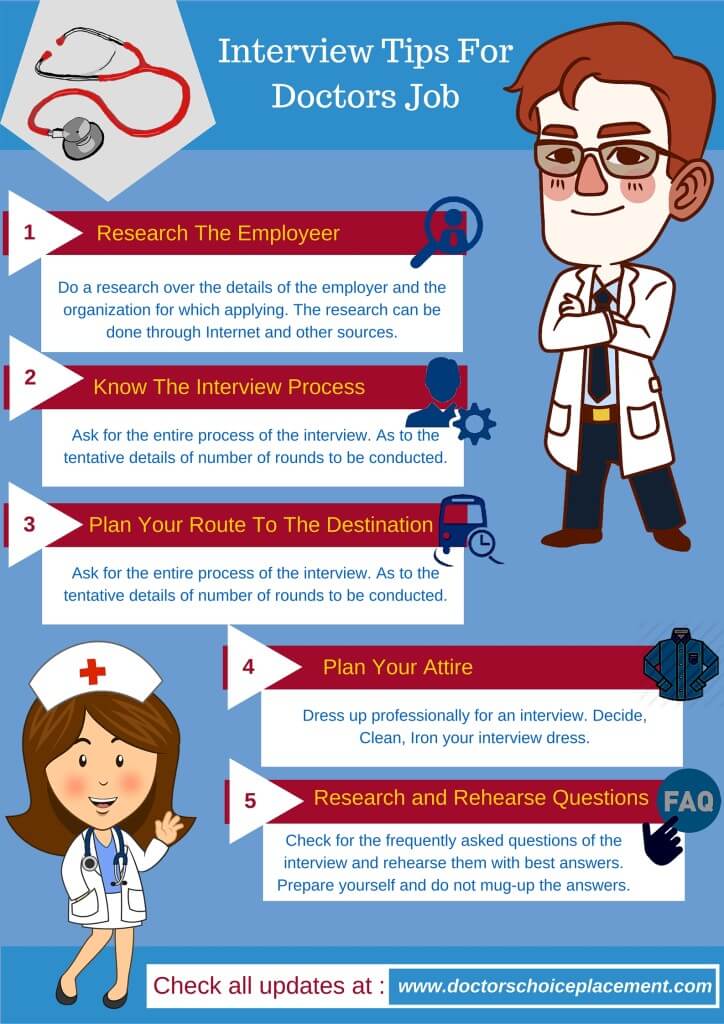For many, interviewing for new physician employment or placement is a nerve-wracking experience. However, it doesn’t have to be! Here are ten interview tips for medical professionals that will help smooth the way to your new hospitalist jobs in Ohio, Pennsylvania or any other area around the world.

1. Prepare (Yes, Even More!):
Sure, you’ve read the job description for the position you’re interviewing for, and you’re knowledgeable about your capabilities and your specialty. That’s not nearly enough.
Read also: How To Crack Civil Service Exam In One Attempt
First of all, it’s a good idea to prepare yourself for each interview by doing some in-depth research on the practice you’re interviewing with. A quick glance at the website is good, but there’s much more you can do. Plug the practice’s name into a search engine and see what else there is to know. Do they participate in education, charity, or research? How involved in the community is the practice? Not only will this help you ask meaningful questions during your interview, but it will also give you a head’s up about the practice’s organizational culture.
2. Dress the Part:
You’re not going to show up in sweat pants… we hope. But did you know you can be too overdressed as well? Or that the way you dress might suggest a conflict with the practice’s company culture that you wouldn’t intend to advertise?
A three-piece suit might be overkill, especially at practice with younger physicians. A wacky tie might be a bad idea if the practice values a serious demeanor. Or, these things might earn you brownie points with the interviewer. The point is: you really can’t know for sure. Keep it classic and professional with a business suit in traditional color—this goes for men and women alike.
3. Know That It’s Not Just the Interviewer You Need to Impress:
Did you know that some practices send out a survey to everyone you interact with on interview day? Well, even if you know for a fact that this one doesn’t, don’t forget that it’s really the entire office that’s doing the interviewing, not just HR or one other doctor. Maybe the head of the medical practice isn’t going to ask the receptionist her opinion, but you can bet your bottom dollar that if you make a very poor impression on her, she’ll bring it up herself. Be courteous to everyone you encounter.
4. Ask The Right Questions:
For your first interview, you want to spend as much time on questions that tell you more about the practice, its policies, and its culture. And don’t forget about the practical things: the levels of support staff doctors can expect, the staff hierarchy and reporting structure, the technological resources you’ll have at your disposal (or not), the on-call coverage policies, and so forth. Asking about these things presents you in a professional light, and gives you a great deal of information about what actually working for the practice might be like.
5. Write Your Questions Down:
If you’re thinking, “I’ll never remember all of that!” don’t worry, because our next tip will help you out big time: write your questions down and bring them with you. While you may think it makes you look unprepared, the opposite is true: you appear to be a well-organized, detail-oriented person, and that’s just what you want.
6. Practice a Practice-Centric Attitude:
Until you’ve actually received an offer, it’s not a wise idea to ask a lot of questions about benefits and the like during the interview process. Asking about the base salary prior to the interview is fine—there’s no need to waste their time or yours if it’s not suitable. Everything else can be left alone until the actual negotiating begins. This shows you’re more interested in the practice than your own gain, and that you don’t have a me-me-me attitude.
Read also: Comic Relief for College Students
7. Don’t Dis Your Last Employer:
No matter how much you dislike your last employer, you absolutely should not say anything negative about them in the interview. You don’t need to lie—just keep your phrasing as neutral as possible. Being a negative Nancy gives you no advantage and can be very detrimental.
8. Project Confidence:
The key to projecting confidence is moderation. Be professional and friendly. Don’t fidget or slouch. Answer the interviewer’s questions and then ask a few of your own—keep the conversation going.
9. Don’t Forget to Follow Up:
Actually, start following up before you even leave the premises! A simple “when can we touch base” or asking the interviewer how they’d like to proceed is fine.
10. Silence Your Devices:
Don’t forget to silence your phone or other devices before the interview. It’s distracting (not to mention rude) to be receiving calls or notifications during the interview process.
Read More:






















